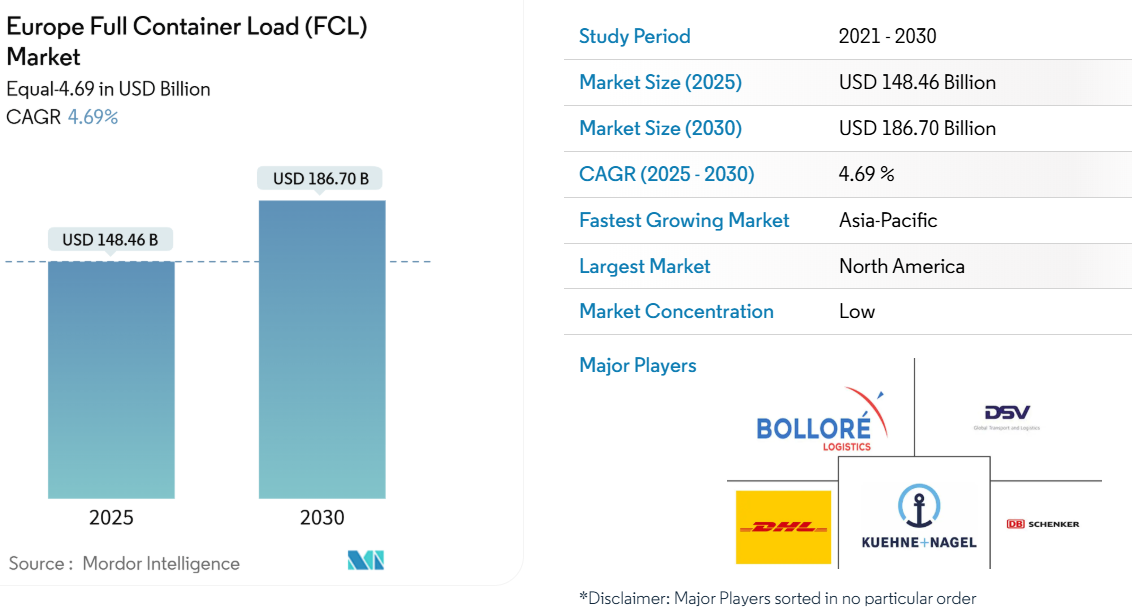Mordor Intelligence has published a new report on the Europe’s Full Container Load Market, offering a comprehensive analysis of trends, growth drivers, and future projections.
The European Full Container Load (FCL) market is on a trajectory of significant growth, with projections indicating an increase from USD 148.46 billion in 2025 to USD 186.70 billion by 2030, reflecting a compound annual growth rate (CAGR) of 4.69%. This expansion is primarily driven by the surge in e-commerce activities, technological advancements in logistics, and the region’s strategic position in global trade. Full Container Load (FCL) shipping refers to the transportation of goods where an entire container is utilized by a single shipper, offering advantages such as reduced transit times, minimized handling risks, and cost efficiencies for large shipments. In Europe, the FCL market plays a pivotal role in facilitating international trade, serving as a backbone for various industries including automotive, chemicals, fast-moving consumer goods (FMCG), and technology. The market’s growth is bolstered by Europe’s robust infrastructure, strategic port locations, and the increasing demand for efficient and reliable shipping solutions.
Key Trends
-
E-commerce Expansion: The rapid growth of e-commerce has significantly increased the demand for reliable and timely shipping solutions. Consumers’ expectations for quick deliveries have prompted retailers and manufacturers to opt for FCL services to streamline supply chains and meet customer demands efficiently.
-
Technological Integration: The logistics industry is witnessing a digital transformation with the adoption of technologies such as artificial intelligence (AI), Internet of Things (IoT), and blockchain. These advancements enhance supply chain visibility, optimize route planning, and improve inventory management, thereby increasing the efficiency of FCL operations.
-
Sustainability Initiatives: Environmental concerns are prompting the logistics sector to adopt sustainable practices. The integration of eco-friendly technologies and the optimization of shipping routes contribute to reducing the carbon footprint of FCL operations, aligning with global sustainability goals.
-
Infrastructure Development: Investments in port infrastructure and intermodal transport facilities are enhancing the efficiency of FCL services. Modernized ports equipped with advanced handling equipment and improved connectivity facilitate smoother and faster container movements across Europe.
Market Segmentation
The European FCL market is segmented based on service type, end-user industry, and geography:
-
By Service Type:
-
Transport: Involves the physical movement of containers from origin to destination, encompassing various modes such as sea, rail, and road.
-
Freight Forwarding: Encompasses services related to the organization and coordination of shipments on behalf of shippers, including documentation and customs clearance.
-
Other Services: Includes value-added services such as warehousing, packaging, and supply chain consultancy.
-
-
By End-User Industry:
-
Automotive: Relies on FCL for the transportation of vehicles and components, ensuring timely delivery to assembly plants and dealerships.
-
Chemicals: Utilizes FCL to safely transport bulk chemicals, adhering to stringent safety and regulatory standards.
-
FMCG: Employs FCL to distribute consumer goods efficiently, meeting the high demand and quick turnover characteristic of this sector.
-
Retail: Involves the movement of goods to retail outlets, supporting inventory replenishment and distribution strategies.
-
Fashion and Lifestyle: Utilizes FCL to transport apparel and accessories, catering to seasonal demands and fashion cycles.
-
Reefer (Perishables): Involves the transportation of temperature-sensitive goods such as fruits, vegetables, pharmaceuticals, meat, fish, and seafood, requiring specialized refrigerated containers.
-
Technology: Encompasses the shipment of consumer electronics and home appliances, ensuring secure and timely delivery to markets.
-
Other End Users: Includes industries such as construction, agriculture, and machinery, which utilize FCL services for various logistical needs.
-
-
By Geography:
-
Germany: A key player in the FCL market, benefiting from its central location and advanced logistics infrastructure.
-
United Kingdom: Significant market presence due to its extensive trade networks and major ports facilitating FCL operations.
-
France: A prominent market with strategic ports and a strong industrial base contributing to FCL demand.
-
Russia: Emerging market with growing investments in logistics infrastructure, enhancing its role in FCL services.
-
Rest of Europe: Encompasses other European countries contributing to the FCL market through regional trade and specialized industries.
-
Get a Customized Report Tailored to Your Requirements. – https://www.mordorintelligence.com/market-analysis/full-container-load
Key Players
The European FCL market is characterized by the presence of both global and regional logistics providers offering comprehensive services:
-
Kuehne + Nagel International AG: A leading global logistics company offering extensive FCL services, leveraging advanced digital platforms to enhance customer experience.
-
DHL: Provides integrated FCL solutions with a focus on sustainability and technological innovation, catering to various industries across Europe.
-
DB Schenker: Offers a wide range of FCL services, emphasizing efficient supply chain management and customized logistics solutions.
-
DSV Global: Delivers comprehensive FCL services, integrating advanced technologies to optimize logistics operations and enhance service quality.
-
Bolloré Logistics: Specializes in FCL services with a strong emphasis on sustainability and digital transformation, serving diverse industry sectors.
Conclusion
The European Full Container Load market is poised for substantial growth, driven by the e-commerce boom, technological advancements, and strategic infrastructure developments. As industries increasingly rely on efficient logistics solutions to meet consumer demands, the role of FCL services becomes ever more critical.
Industry Related Reports

